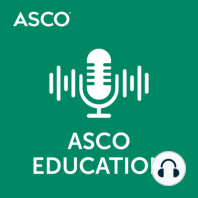5 min listen

Recently Approved Drugs: Nivolumab for patients with metastatic small cell lung cancer
FromASCO Education
Recently Approved Drugs: Nivolumab for patients with metastatic small cell lung cancer
FromASCO Education
ratings:
Length:
5 minutes
Released:
Sep 5, 2018
Format:
Podcast episode
Description
Victoria Lai is a thoracic medical oncologist at Memorial Sloan Kettering Cancer Center with a clinical and research focus on small cell lung cancer and other pulmonary neuroendocrine tumors. She conducts clinical trials that aim to elucidate the underlying biology of small cell lung cancer in order to develop new biomarkers and treatments options to improve patient outcomes. TRANSCRIPT [MUSIC PLAYING] Welcome to the recent approvals episode of the ASCO University weekly podcast. My name is Victoria Lai. I am an assistant attending physician in a thoracic oncology service at Memorial Sloan Kettering Cancer Center. Today, we will discuss the approval of nivolumab for the treatment of patients with metastatic small cell lung cancer in the third-line setting. As a background to today's discussion, we know that FDA approved therapies for small cell lung cancer are extremely limited and remain a large, unmet need. Immune checkpoint inhibitors, including nivolumab, are active therapies in several different tumor types. Nivolumab is a monoclonal antibody against PD-1 and has previously been shown to be effective in non-small cell lung cancer. More recently, the role of immune checkpoint inhibitors in the treatment of small cell lung cancer has been explored in an effort to develop more effective treatment options for these patients. On August 16 2018, nivolumab was granted an accelerated approval by the FDA for the treatment of patients with metastatic small cell lung cancer with disease progression after prior platinum-based chemotherapy and at least one other line of treatment regardless of PD-L1 expression of the tumor. This approval of nivolumab in the third-line setting in small cell lung cancer was based on results from the CheckMate 032 study that was initially published in The Lancet in 2016 and has since reported updated results. CheckMate 032 was a multi-center open-label trial in patients with metastatic solid tumors. The study included a subgroup of 109 patients with metastatic small cell lung cancer who experienced disease progression after platinum-based therapy and at least one other line of therapy regardless of tumor PD-L1 status. All patients received nivolumab 3 milligrams per kilogram by intravenous infusion over 60 minutes every two weeks. The primary endpoint of this study was the objective response rate. The overall response rate was 12% with a 95% confidence interval between 6.5 to 19.5% with responses seen in 13 out of 109 patients. Responses were durable for six months or longer in 77% of patients, 12 months or longer in 62% of patients, and 18 months or longer in 39% of patients. PD-L1 tumor status did not appear to be predictive of response. Of all the patients who received at least one dose of nivolumab, the most common side effects were fatigue, decreased appetite, musculoskeletal pain, dyspnea, nausea, diarrhea, constipation, and cough. Serious adverse reactions occurred in 45% of patients and included pneumonia, dyspnea, pneumonitis, pleural effusion, and dehydration. The recommended dosing schedule of nivolumab for this approved indication is 240 milligrams every two weeks over 30 minutes. The approval of nivolumab as subsequent line therapy marks a significant advancement in the treatment of patients with metastatic small cell lung cancer. Prior to this, topotecan was the only other agent approved by the FDA for treatment in this setting, which did not yield durable responses. Although the response to nivolumab was modest, the majority of patients responded to treatment were able to achieve durable responses of greater than 12 months with over 1/3 of patients achieving a durable response of greater than 18 months. Further more, responses to nivolumab were seen regardless of the patient's prior response to chemotherapy. Given that topotecan yields a response rate in the single digits as subsequent line therapy for chemo-resistant disease, nivolumab adds an especially valuable treatment option for t
Released:
Sep 5, 2018
Format:
Podcast episode
Titles in the series (100)
Continuity of Care for AYAs: Continuity of Care for AYAs by ASCO Education